Whenever I write about something touching on my experience of communism, I get a few kind commenters encouraging me to share more of it. I rarely do so, as busy life takes over. Still, today I managed to post an article on my other blog, Media Influencer, that I felt was perhaps not coherent enough or too personal for Samizdata.net. For those interested, follow the bananas…
|
|||||
|
Stepping out of the Hyatt in Istanbul yesterday morning to the sound of the muezzins calling to prayer, an ancestral shudder came over me. The chant was alien but not insignificant. I grew up with tales of Turkish invaders ravishing my country’s land and no doubt many a fair maiden (no wonder that my eyes have a hint of almond shape). It was the buffer zone between the Ottoman Empire and the West and had endured the waves of invasions by Avars, Tartars and Turks throughout its history. There are many castles in Slovakia, each with its own story of siege and resistance to tell, which have become part of the fabric of the nation and its folklore. I did not expect Istanbul to remind me of all this. I came here from an entirely different direction – to find whatever traces of Constantinople still remain. Hagia Sofia was to be the highlight of my visit. As a child I remember leafing through my mother’s books on history of art and two pictures made a profound impression on me – Sainte-Chapelle and Hagia Sofia. I promised myself that one day I would see them, no matter what. This was no mean feat for a 10-year old living in deep communism, with not much hope of ever getting as far as the other side of the Danube to Austria. But one lives and dreams. So when I was invited to speak at a conference in Istanbul, I accepted. Time to see Hagia Sofia, I thought. I was very much looking forward to it, expecting the Byzantine shine through the ages of the Islamic. The entrance was grandiose and reminded me of old cathedrals, with rough walls and majestic ceilings. Once I stepped inside the main nave, there was no magic for me. It was dark and gloomy but I usually do not mind that. It struck me as dilapidated and forgotten, the calligraphic roundels with Arabic script the victor’s graffiti stuck on to mark his prize winnings. There are still marks on the wall where the original crosses were ripped out. 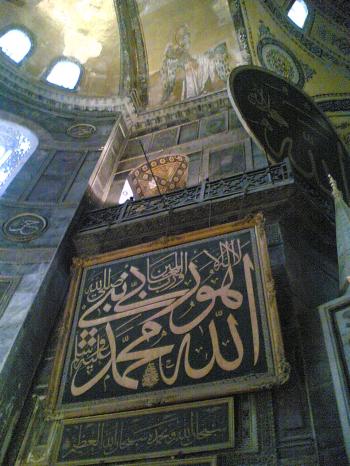
I wondered around for a while trying to unwrap the beauty of the place. I did find the magic in the end. The mosaics are exquisite and one has to gasp at the image of the entire church decorated with them. The great dome used to be covered in golden mosaic and the tinkling sound of pieces dropping to the ground was familiar to visitors until 19th century. 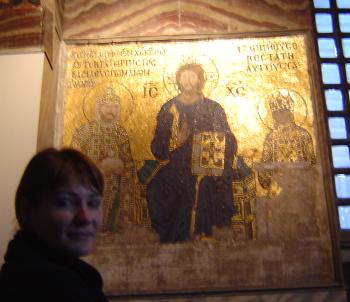 Above the mihrab, the niche indicating the direction of Mecca, is a striking mosaic of the Virgin with the infant and on its right, of Archangel Gabriel. 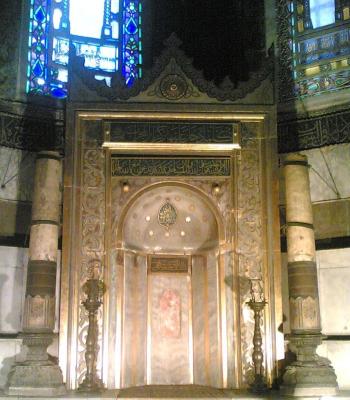
Mosaics of six-winged seraphim adorn four corners of the dome. They contrast strangely with minbar (imam’s pulpit) and other features added by Ottoman sultans after the conquest of Istanbul in 1453, when the church was converted into a mosque. 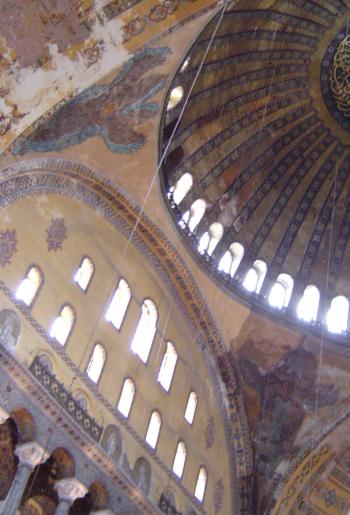 For various reasons I am reminded of a line from Kingdom of Heaven, although not the greatest film ever made, sums up the difference between Islam and Christianity – Mohammed says submit, Jesus says choose. And whether you are a believer or an atheist, there is no denying that this difference has affected the way the two cultures have gone. Today is the 16th anniversary of the Velvet Revolution or of the day when it all ‘officially’ started on Friday 17th November, 1989 at a demonstration in Prague. (There was one in Bratislava the day before but did not get initially much recognition.) It was the death of a student, beaten by the Secret Police (or not so secret police), at the Prague demonstration that day that has pushed the students and actors across the country to articulate political demands, go on strike and start protesting in the streets daily. The theories behind this ‘final straw’ are many and varied – some argue the murdered ‘student’ was an agent provocateur who meant to start the ball rolling and enabled the powers-to-be orchestrate a peaceful, if not just, demise of the communist rule in Czechoslovakia. Time will tell the real story, I am here to remember mine. At the time, 17th of November 1989 did not feel any special – there were some demonstrations before and usually were thinly spread around various anniversaries of dissident occassions. There was no indication that this is to be any different. With a flurry of activity from the dissidents, barely reported by the media and as usual, with more details broadcast by the heavily jammed Voice of America or Radio Free Europe. 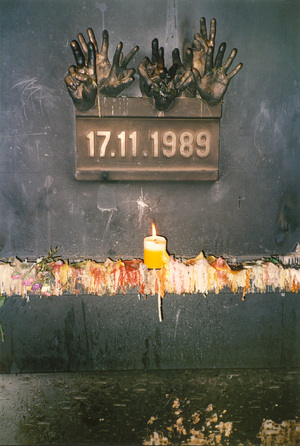 I was then a teenager, with a twist – I knew that I had no control over my future and that I faced two choices only. In order to blend in, accept the evil around me in exchange for a semblance of a ‘normal’ life. Or follow in my parents’ footsteps and forsake all that is considered good and rewarding in a healthy society, such as higher education, travel, even family and potentially freedom. I may have been very young but, alas, not young enough to be blind to the full horrors of such life. After all I had seen those around me living with similar decisions. As it happens, that choice was not real – having been part of the dissident movement, I was weighted, marked and tagged as the enemy of the state. I belonged to the dark forces undermining the society – a phrase so beloved of the communist media. I remember the nervous elation of the ‘now or never’ moment, as we walked to the main square to meet thousands of others who felt the same. It was a powerful sensation to be surrounded by hundreds of thousands of people knowing that they are there for the same reason – an experience unprecedented in a fractured and diseased society under communism. It was not until Monday, 27th of November, when the two-hour general strike took place, that we were sure that tanks will not be rolled out to face us. This was not without reason as on November 23rd the army declared its readiness. To do exactly what, we dared not speculate. At demonstrations between the two dates the list of those supporting the General strike was read out. There was a sense of profound relief when workers from a factory appeared on that list. We knew then that the communists had lost the propaganda war and a loud cheer reverberated across the square. But the fight was not truly over until December 10th, when the first federal government since 1948 was appointed that did not have the Communist majority. We went to the streets once more, most of us looking for and looking forward to the sensation of true solidarity that had already started to fade. And the rest is history… I find that my memories lack the nostalgia compulsory for any survivor of such social and political upheavals. My life has certainly changed beyond recognition as a result of the 1989 events, nevertheless I find it very hard to get dewy-eyed about my ‘revolutionary credentials’. I do treasure the experience of seeing thousands upon thousands of individuals come together in a collective action that has changed the world around them. That was genuine no matter whether it was sparked off by manipulation or whether what followed in the aftermath was far less heroic. “If the French social model is so great, why is the country in flames?” This is a picture of front page of a benign ‘cousin’ of the infamous Pravda (or more like a foundling on the same porch). It is a local paper that covers the small area of the Old Town of Bratislava, thoroughly local, post-communist, and reflecting the concerns of the local populace. Did I mention that it was local? The headline reads: Two Bratislava districts (equivalent of local councils) have raised average wage above 25,000 [crowns]. What struck me was the active tense of that sentence � as if the local government had any control over what wages people get paid. I am told that the current Prime Minister was going around the country on a bicycle during the election campaign promising to double wages for everyone or words to that effect. Nothing extra-ordinary for a politician but people were actually disappointed after election when the wages did not double. When challenged he pointed at the fact that the wages did go up but nobody was fooled because they knew damn well that the cost increased as well. This did not seem to occur to them when the guy was making the promises though. There seems to be the perception that the government still somehow doles out the wages as well as fiddles the cost of everything. Well, they sort of do but not in a good way. I also note the difference between the West and the post-communist East � people in the former talk in terms of rising cost of living and price inflation, people here think of terms of size of salary. I think it reflects the difference in mentality � it is thinking of how much you have rather then how much you can do� CNET News.com reports what we have knowns for some time…
It is frustrating that after months of debate, it is still news. I guess the real news is that it is Microsoft saying that. I particularly like this bit:
So what are the 30 coins worth to a technology supplier, I wonder? But before we rejoice too much, Mr Fishenden is not on concerned about the issue of ID cards and biometrics in the first place, just about a more secure and efficient way of gathering and storing the data:
William Heath has another example that even when governments set out to do a Good Thing, it’s not necessarily worth it.
Predictably enough this was no contest.
Euro-lib sounds a bit sleezy, doesn’t it? Anyway, William then picks on the Euro efforts to develop a search engine called Quaero widely seen as a potential competitor to Google. (!) Oh dear.
We hear you… Note: William has started another Ideal Government project, this time about Europe, Ideal Government Europe. I meant to blog about it and others already beat me to it. In the sidebar blurb William asks:
The answer to his questions is a resounding NO from where I am standing and I am not holding my breath at William’s or anyone’s chance to affect anything to do with the EU, however, can’t blame the man for trying to voice his objections when he gets the opportunity to make them to the EU audience and add the bloggers voices to his own. I like New York. It is very different from London although they both share the same characteristics of a big city. What I like most about New York is its sense of history. The Art Deco architecture, the 1930s feel to the city, the strange effect of light in the streets that comes through the skyscrapers. Last night I was on a yacht cruise going from New Jersey and sailing around west Manthattan, the Statue of Liberty and Ellis Island all evening. As I could not talk, having lost my voice, it was time to watch the view. It was a spectacular one, beautiful and inspiring. Going around the Ellis Island, I thought about all those who saw the same sight before me. There were many people from my country (it was part of the Austro-Hungarian Empire then) coming to America in 19th century and one thing I am sure of is that their experience of New York was very different from mine in 21st century. Although the comparision may be rather pointless, as I am coming from London these days, the ‘going to America’ is an integral part of the Slovak history that comes to mind when seeing what to them was America’s ‘front doors to freedom’.  cross-posted from Media Influencer Totalitarian systems are not sustained at the top, but at the bottom, where a system of mutual surveillance prevails. The influence of Desert Islam on the region has engendered just such a totalitarian system, whereby a woman who refuses to wear the hijab is stigmatised, and possibly threatened with violence. Even in liberal Lebanon, where women have historically been highly expressive in their dress, the present generation is increasingly adopting the hijab and shaming those who don’t. Some people see this trend as a reaction to the West and modernity. It is anything but. It is merely a succumbing to the encroaching influence of Saudi-funded Desert Islam, a totalitarian system expounded by highly rational modern means. Note: This article was published on Social Affairs Unit blog and someone (we do not know who) redirected the url of www.islamchannel.com to point at it, to much consternation of the Islam Channel and bafflament and bemusement of the Social Affairs Unit. It also attracted some atypical commenters… I had never heard the word blogger until May 25 . But now I know them well because of all the amazing coverage they had of the protests. My friends overseas all followed what happened through the blogs, because they have more credibility than the mainstream media. A very nice line up on Instapundit of the blogosphere’s reactions to MSN journos putting their foot in it again… Bill Quick on reading an article in Philadelphia Inquirer (registration required):
The brain terminal on Paul Krugman’s cavalier attitude to the truth:
Annoying gadfly blogswarms indeed. |
|||||

All content on this website (including text, photographs, audio files, and any other original works), unless otherwise noted, is licensed under a Creative Commons License. |
|||||

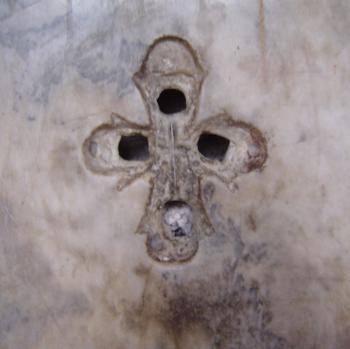
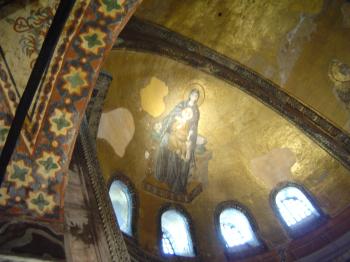
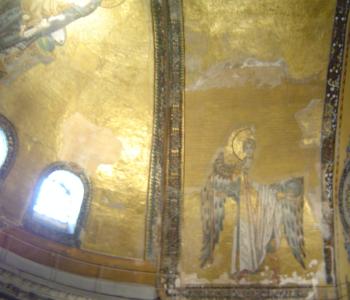
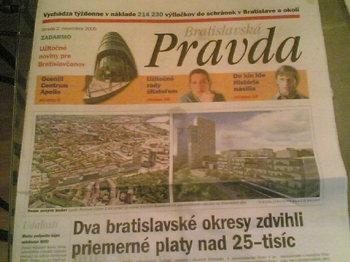
-thumb.jpg)


